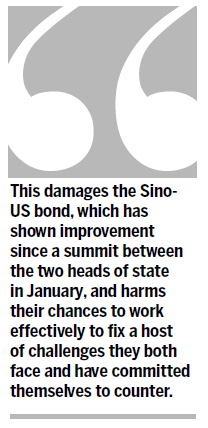
Washington's new arms sale to Taiwan squanders chances for further cooperation in political and economic areas
Despite Beijing's strong protests, the United States has decided to provide weapons worth of $5.852 billion to Taiwan. Washington's announcement that it will upgrade Taiwan's F-16A/B fighters is a serious blow to improving Sino-US relations.
This time, the White House argues that it has exercised self-restraint by merely deciding to upgrade Taiwan's F-16A/Bs. This is intended to mean the US has kept its commitment to both Beijing and Taipei to provide only defensive weapons systems to maintain the balance of military power across the Straits.
This is an incorrect argument. No country is entitled to intervene into another country's internal affairs, China's included, short of a United Nations' Security Council mandate. Indeed all people need protection for their legitimate rights, peace and prosperity. The UN Charter accords such rights to all the people in the world, including the Chinese. This global organization ensures sovereignty to all nations, and it stands unless the Security Council approves to intervene in the event of a massive disaster.
China's economic opening-up and social reform increasingly provides peace and prosperity for both mainlanders and Chinese people living in Taiwan. For the first time in decades, Chinese people living on either side of the Straits are enjoying intensive economic co-development and co-prosperity and the lowest tensions ever under an agreed-upon one-China consensus. Legally and morally, there is no justification whatsoever to warrant international intervention into China's domestic integration.
It is true that people living on the island deserve protection, as mainlanders do as well. Nevertheless, it is up to all Chinese people to work together to protect themselves collectively. Should either side be attacked by a foreign force, Chinese living on either side of the Straits shall organize themselves to deliver the needed assistance for national defense. In a time of peace, they shall cooperate to eventually remove various hurdles that still stand between them, reducing mutual suspicion and fostering better mutual trust.
While Taiwan residents deserve protection, it should not come at the expense of the rights of Chinese people living on the mainland, namely national sovereignty and integration. China has formed during a process spanning tens of centuries, and it is of the utmost importance to all Chinese people that the nation remains integrated. The mainland prefers to attain peaceful integration with Taiwan in time, and will resist with all means at its disposal any effort to tear the nation apart.
The Chinese people appreciate American assistance delivered during World War II. We also appreciate American cooperation in the economic arena as China embarked on reform and opening-up.
Over the past three decades, China and the US have collaborated quite successfully to achieve a win-win outcome. Indeed, they have tapped into each other's labor and investment to boost their economies and world prosperity. In the meantime, China and the US have expanded their cooperation in many regional and global aspects. Such efforts stabilize the world and improve international relations. In fact, they are indispensable when good global governance is required to respond to the challenges of the financial downturn and the debt crisis that have presented themselves to many countries around the globe.
Though the US has declined to provide F-16C/Ds fighters to Taiwan, its upgrade of the F-16A/Bs is still a serious incursion into China's core interests. This damages the Sino-US bond, which has shown improvement since a summit between the two heads of state in January, and harms their chances to work effectively to fix a host of challenges they both face and have committed themselves to counter.
Such a negative scenario is not one China wants but one China must respond to. Clearly, when the two countries have been so closely interdependent, it is impossible that the US would not be affected after it caused such harm to China. Expecting China to take this harm without asserting its rightful interests, just because the two countries are mutually dependent, is increasingly unrealistic. The US will have to deal with the consequences.
For a long time the US has stressed its global leadership, but this leadership would benefit others more if Washington would follow international laws. It is hard to claim the US is "a city upon a hill" when it shows no respect for international law. Indeed, the world would be a more chaotic place if other countries followed US disrespect of international norms, especially as global power is quickly being re-balanced.
The US should be aware of the shift in power in the western Pacific. By collaborating with China economically and financially, the US will gain far more benefit than the $5.852 billion weapons sale brings.
However, by trying to contain China by arming Taiwan, the US will squander better chances at economic revitalization and building a better world order.
The author is a professor at Fudan University in Shanghai and director of its Center for American Studies.
(China Daily 09/23/2011 page8)